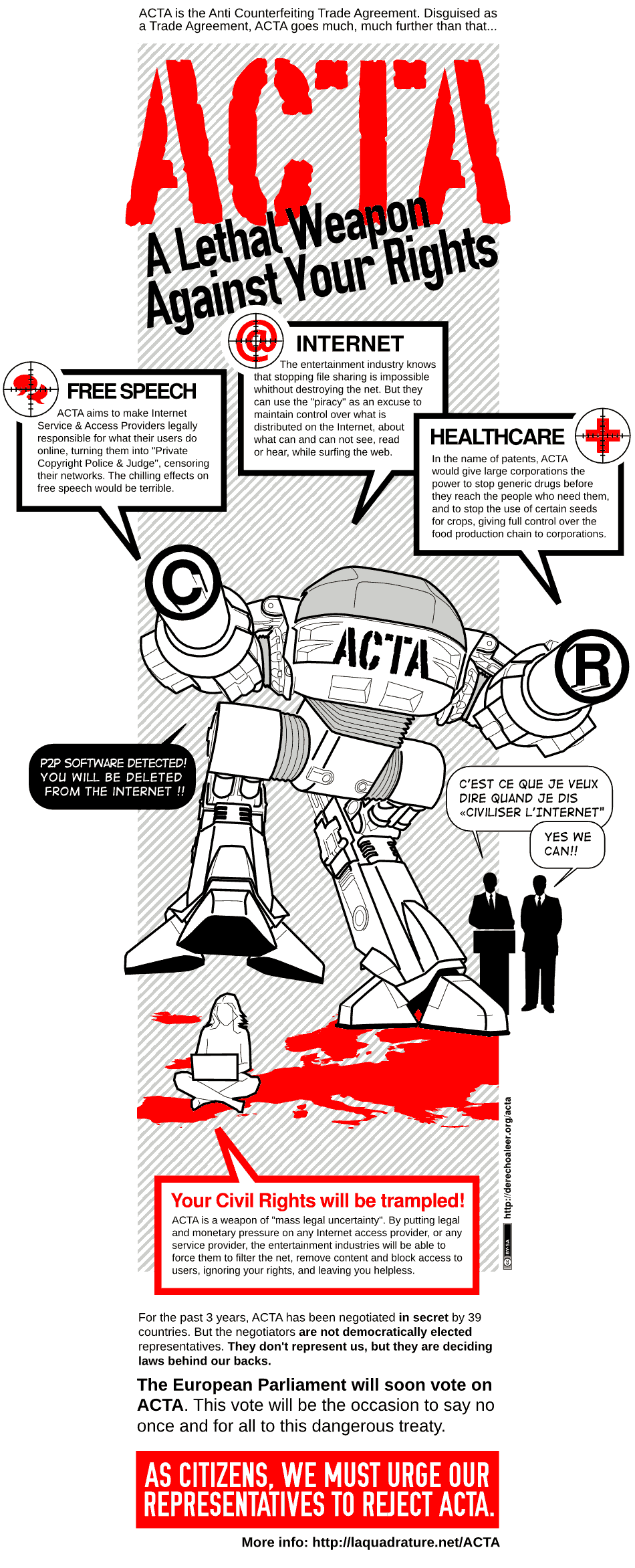Since Spring 2007, 39 countries (27 member states of the European Union, the United States, Japan, Canada, South Korea, Australia, México as well as a few other countries) negotiated in secret a trade agreement aimed at enforcing copyright and tackling counterfeited goods: ACTA. Leaked documents show that one of the major goal of the treaty is to force signatory countries into implementing anti file-sharing policies under the form of strong criminal sanctions.
ACTA is one more offensive against the sharing of culture on the Internet negotiated by a small "club" of like-minded countries. Negotiated instead of being democratically debated, ACTA bypasses parliaments and international organizations to dictate a repressive logic dictated by the entertainment industries.
At a time when important debates are taking place on the need to adapt copyright to the digital age, this treaty would bypass democratic processes in order to enforce a fundamentally irrelevant regulatory regime. It would profoundly alter the very nature of the Internet as we know it by by putting legal and monetary pressure on Internet service providers (in a most subtler way than in previous versions of the text), ACTA will give the music and movie industries a legal weapon to force ISPs to police their networks and users themselves.
Please read the final analysis of the text signed by non elected representatives and why we need to defeat it together.
INFOGRAPHIC
Robocopyright by Derechoaleer.orgDOWNLOAD AND SHARE AND REMIX
6 Reasons to oppose ACTA
ACTA locks countries into obsolete copyright and patent laws. If a democracy decides on less restrictive laws that reflect the reality of the internet, ACTA will prevent that.
ACTA criminalizes users by making noncommercial, harmless remixes into crimes if "on a commercial scale" (art 2.14.1). Many amateur works achieve a commercial scale on sites like Youtube. ACTA, like SOPA, could mean jail time for the Justin Biebers of the world.
ACTA Criminalizes legitimate websites, making them responsible for user behavior by "aiding and abetting". (art 2.14.4). Like SOPA, the founders of your favorite sites could be sued or (worse) thrown in jail for copyright infringement by their users.
ACTA will let rightsholders use laughably inflated claims of damages (based on the disproven idea that every download or stream is a lost sale) to sue people. As if suing amazing artists, video makers and websites for millions wasn't hard enough!
ACTA Permanently bypasses democracy by giving the "ACTA Committee" the power to "propose amendments to [ACTA]" (art 6.4). In other words, voting for ACTA writes a blank check to an unelected committee. These closed-door proceedings will be a playground for SOPA-supporters like the MPAA.
Trade agreements are a gaping loophole, a backdoor track that, even though it creates new law, is miles removed from democracy. It's a secretive process that's tailor-made to serve politically connected companies. And the movie studios behind SOPA? They're experts at it. If we can't make secretive trade agreements harder to pass than US law, our internet's future belongs to the lobbyists behind SOPA.
From La Quadrature du Net



1 comment:
Ethnic cleansing in Western Uusimaa in May 1918 and Forssa region. Some 200 Finnish civilians, men and women, were executed by the Swedish battalion in Western Uusimaa. The Swedes executed at least 460 Finns in the spring 1918.
TV and newspapers broadcast disinformation about history and all political issues. Censorship in the mainstream media makes Sweden, Finland and Norway a kind of dictatorship countries, ruled by the political and economic elite.
In the Scandinavian countries the political and economic elite controls the media.
Finnish government to ban our organization? Helsinki district court was ready to ban our organization! An official had told this threat to our chairman in a meeting in the Ministry for Internal Affairs.
A government's threat to ban a peaceful organization (because of its opinions) violates the principles of democracy.
Post a Comment